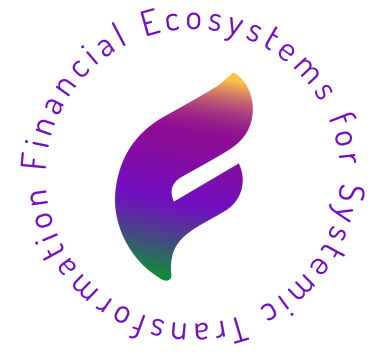Ecosystems for Financing Systemic Transformation
Developing new financial ecosystems is key for systemic transformation. These ecosystems require financing three different activities.
Financial systems and their inertia are critically factors in maintaining the status quo in the face of calls for transformation. They include all the financial industry businesses, policies, and regulatory structures. They are based in particular mental models, goals and values that lead to limiting assumptions about what is possible. These financial systems are proving inadequate in our era of polycrisis. Indeed, they are an important source of growing social-economic inequity and pursuit of business in a way that is producing widespread environmental collapse.
"You never change things by fighting the existing reality. To change something, build a new model that makes the existing model obsolete." – Buckminster Fuller
Systemic transformation efforts are grounded in new goals (transformation, sustainability) and values (e.g.: flourishing life). Efforts to work within the current financial system like socially responsible investing, creating new funds, ESG, and impact investing are fighting what Fuller calls “existing reality”. A new model – new systems – are needed to avoid co-optation. The goals and values require distinct (although linked) supportive structures, processes, tools and operating environments. These are emerging ecosystems for financing systemic transformation (FST).
Examples of FST usually begin with modest effort such as creating a new fund, but deeper and longer-term experience leads to production of new FST ecosystems. The Climate Investment Fund of the World Bank, for example, started in the classic tradition of a pool of national government money to address climate change. Over fifteen years, it has developed its distinctive evaluation, capacity development, engagement of other funders, and deal aggregation processes. It has developed a new financing system in support of its transformational climate change goals. Co-Impact has developed a similar system with high networth and foundation investors working with those in the Global South for transformation. Similarly, Big Society Capital has created an ecosystem with diverse sources of capital. But the starting point does not have to be with pooling of money. Industree started with its network of 11,000 farmers and artisans in India to create an FST ecosystem; Innpactia is developing such as system based on unusual processes to identify transformational projects and bridge to funders; TransCap is growing out of its particular knowledge about how to organize such systems and its connections; a new social stock exchange opening this year in Scotland will be doing the same with that new institution as its base.
The map below is a visual representation of such a system. It builds on observation of the examples of successful FST. Those providing money are in the left to upper-center; those closely involved in project implementation are in the lower right. This representation arose from looking at a range of transformational finance activities. It also reflects conclusions of a recent investigation into nearly 100 transformational innovations in a variety of fields that identified “economic operating infrastructure (EOI)” as the focus of successful economic transformation. “Operating” infrastructure like markets are network infrastructure and organizing forms supporting economic production. Some form of exchange of goods and services is required by an economy, regardless of its values. Mechanically, the same things are needed. But how those activities are carried out is determined by underlying values and goals. The Map presents finance as an EOI. It suggests the value of self-conscious system organizing through governance structures that re-align power to address the traditional finance system's privilege given to those controlling finance. It also points to the need of financial support for the system's maintenance, not just investment actions.
The Map is a simplistic Value Network Analysis of the roles and exchanges between them that are necessary for any financial system. (“Financier” refers to philanthropic, government, private money.) FST pioneers are designing ecosystems that embed the values and goals associated with FST like sustainability and flourishing life. The map also emphasizes the need to provide financing for the operation and development of the ecosystem, not just for project implementation where the vast majority of money providers focus.

Many initiatives are evolving to address particular roles in these financial ecosystems. For example, those making contributions to the Assessor role include The Investment Integration Project, Predistribution Initiative, Blue Marble Evaluation and those promoting movement from GDP to happiness and human development.
Currently, new FST ecosystems are emerging around issues like climate change and geographies such as with bio-regions. These can be considered “pockets of the future” – evolving protoypes of a our future financial systems.
We need your consent to load the translations
We use a third-party service to translate the website content that may collect data about your activity. Please review the details in the privacy policy and accept the service to view the translations.

